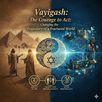Pinchas: Moral Courage In A World Of Confusion
- Rabbi Yosef Vogel
- Jul 26, 2019
- 3 min read

As a young boy I visited the John F. Kennedy Presidential Museum in Boston which made a deep impression upon me. Walking around the vast campus one hears a vast array of some of the 20th centurie’s most eloquent speeches from John Kennedy and his brothers. The speech which made a most profound impact on me was the eulogy given by Ted Kennedy at the funeral of his brother Robert who was assassinated - because he spoke out in support of Israel - in June 1968. “My brother need not be idealised or enlarged in death beyond what he was in life, to be remembered simply as a good and decent man, who saw wrong and tried to right it, saw suffering and tried to heal it, saw war and tried to stop it”. This most eloquent summary of a great American hero best sums up our mission and purpose as Jews in the world in which we live. Each and every one of us was born in order to make the world a better place. However the challenges to this idealistic approach are many. Is it not more important to take care of ourselves and our families? What can I as a mere individual do to make a difference? Who am I to make a judgment about what is right and wrong? The challenge today is that we as a society have lost our moral clarity. There is no more right and wrong. There are just “opinions”. And everyone is entitled to their own “opinion”. Even gender is no longer an absolute, it is subject to personal preference. Here again Robert Kennedy sums it up best in a speech he made to the young people of South Africa in 1966. He said: “Few are willing to brave the disapproval of their fellows, the censure of their colleagues, the wrath of their society. Moral courage is a rarer commodity than bravery in battle or great intelligence. Yet it is the one essential, vital quality for those who seek to change a world that yields most painfully to change”. But in order to muster the moral courage needed we first need moral clarity. The question is, how does one obtain moral clarity in a world of confusion? A lesson can be drawn from this week’s Torah portion. In it we read about Zimri, a leader of the tribe of Shimon, who brings a Midianite woman into the camp with whom he flagrantly engages in an intimate way. Sensing that Moses felt powerless, Pinchas seizes the initiative stabbing and killing them both, ending this gross misconduct and a devastating plague. The tribe of Shimon were furious. How could a young man behave in such a violent way. Surly this act of zealousness has no place in Jewish life they argued. No doubt this is the behavior of an angry person venting his violent impulses. G-d however saw things differently. The narrative seeks to dispel this distorted view of Pinchas by attesting to the fact that he was a grandson of Aaron the High Priest. Aaron was defined by his peace loving nature. In other words G-d is teaching us that because we know Pinchas to be of a peace loving nature, the violent act he perpetrated must be seen as completely selfless. The keyword in this story is “selfless”. Pinchas rises to the occasion because he has the moral courage to do so. Moral courage con only be achieved once we have gained moral clarity. Which in turn can only be achieved if we have no personal agendas. Moral courage inspired by moral clarity must be predicated on purely selfless motives. Only then can we be sure that our actions will be in the best interest of the greater good.






Comments